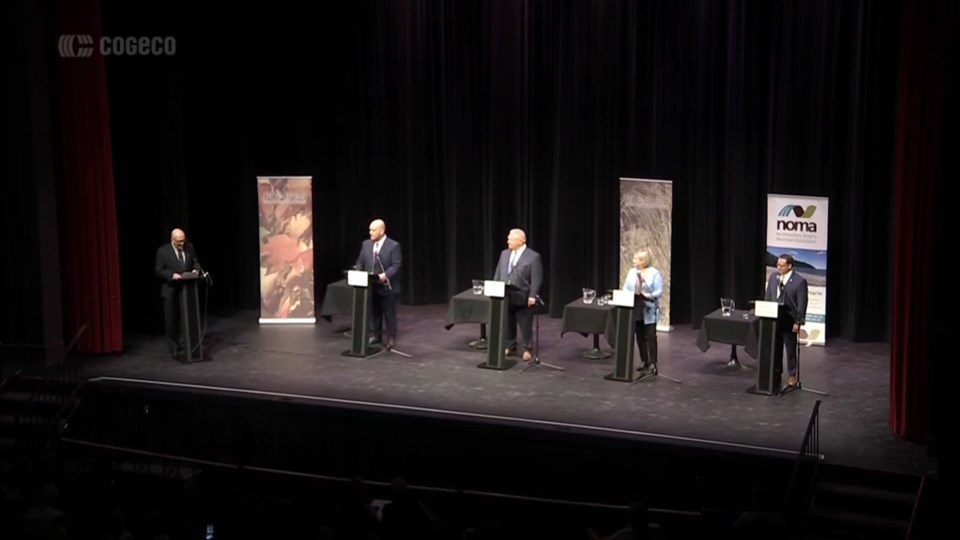THUNDER BAY – The first leaders’ debate of the provincial election focused squarely on issues impacting Northern Ontario, drawing out promises both new and familiar.
The debate, held in North Bay on Tuesday by the Federation of Northern Ontario Municipalities (FONOM), included the heads of all four major parties, with Green Party leader Mike Schreiner joining for the first time.
The event was dominated by talk of roads, the opioid crisis, the rising cost of living, and health care, and in many cases centred around commitments – like four-laning regional highways or restoring Northlander rail service – the region’s residents have heard before.
A recording of the debate continues to be available online.
FONOM kicked off the debate by pointing to municipal infrastructure challenges, asking leaders if they would open revenue tools beyond property taxes for local governments, as the province has done for Toronto.
Asked if they’d consider similar legislation for other municipalities, only Schreiner said he was open to the idea, but all candidates save Ford agreed more costs currently shouldered by municipalities should be “uploaded” to the province, reversing a downloading trend that took hold in the 1990s.
Schreiner said the Green Party would look to upload 50 per cent of public transit costs to the province, and consider similar arrangements for other priorities.
“Every time the province, particularly under the Conservatives, downloads costs onto municipalities, that means increased property taxes, which is the most regressive form of tax in our province,” he said.
Del Duca, meanwhile, highlighted a Liberal pledge to pass on five per cent of the existing mining tax to First Nations and municipalities.
It’s a comment Ford misrepresented shortly thereafter, incorrectly suggesting Del Duca was proposing new taxes on the mining industry.
Asked about the state of northern highways, Ford defended his government’s record, saying it had moved forward with twinning Highway 17 westward from Kenora and Highway 11/17 between Thunder Bay and Nipigon, for example, and pointing to the introduction of Ontario’s first 2+1 highway pilot on Highway 11.
Responding to promises from Del Duca to move more quickly with highway four-laning projects, Ford slammed his opponent with a line that was typical of repeated attempts to tie him to past Liberal controversies.
“Mr. Del Duca, you had your opportunity, and you failed,” he said. “You were the Minister of Transportation – you didn’t build absolutely nothing.”
Horwath joined Ford in attempting to tie Del Duca to the record of the previous Liberal government, saying he “had 15 years” to address problems he was now pledging to fix, though he’s spent less than a decade as an MPP and just four years in Kathleen Wynne’s cabinet.
Del Duca, meanwhile, emphasized he’s leading a “new Liberal team” with fresh policies, but would not be drawn in to debating the McGuinty and Wynne governments’ records.
His commitment to restore Northlander rail service, which was cut under the previous Liberal government, drew more taunts from other candidates on stage.
“The Liberals had 15 years and they ignored the north – they shut the Northlander down, they sold off Hydro One, they closed schools,” said Horwath. “I get it – [Del Duca] doesn’t want anybody looking in the rear-view mirror, because they left a wreck back there.”
Schreiner pledged to reverse the privatization of highway snow plowing, saying it had resulted in higher costs and lower service.
The Green leader made a habit of giving clear answers to questions his counterparts dodged, standing as the only leader to commit to establish a centre of excellence for mental health and addiction in the north, as recommended by the Northern Policy Institute. He noted overdose deaths are three times worse in Northern Ontario than elsewhere in the province.
Schreiner also argued governments must focus on the social determinants of health, like poverty and housing, to truly tackle the crises of addictions and mental health.
“We’re the only party in Ontario calling for doubling the rates people on disability [supports] receive, because they’re living in legislated poverty right now.”
Ford called the addiction issue “personal,” saying his government had overseen spending increases on addiction treatment, including some new beds in Thunder Bay, and created the province’s first Minister of Mental Health and Addiction.
Horwath said that record was tarnished by the government’s moves to limit safe consumption sites and investments that are still badly insufficient, pointing to her party’s commitments to supportive housing.
Del Duca said his government would be interested in considering a centre of excellence, and would inject $3 billion in new mental health funding over four years.
The next leaders' debates is scheduled for May 16.
